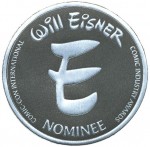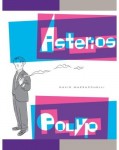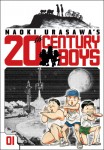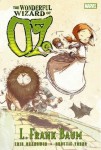Eisners: The Oscars of Comics


This last Friday the nominations list for the Will Eisner Comic Industry Awards were announced. The Eisner Awards, now in their 22nd year, are the Oscars of the comics industry, featuring close to thirty categories and highlighting everything comics related including best writer, colorist, and penciler to honoring new titles, series, and academic work. The nominations, as with the Oscars, are voted on by those within the industry.
 The nominations list is created every year by a panel of five judges made up of industry experts, creators, comic shop owners, and, for the past five years one of their number has been a librarian. This year librarian Francisca Goldsmith holds that honor, as I did back in 2007. It is a grueling, invigorating, demanding process. Paring down thousands of titles into a list of a just under 150 works is a Herculean task.
The nominations list is created every year by a panel of five judges made up of industry experts, creators, comic shop owners, and, for the past five years one of their number has been a librarian. This year librarian Francisca Goldsmith holds that honor, as I did back in 2007. It is a grueling, invigorating, demanding process. Paring down thousands of titles into a list of a just under 150 works is a Herculean task.
Looking at this year’s list with a strong memory of how much work it takes, this year’s round up is a solid, intriguingly eclectic list. David Mazzuccheilli’s Asterios Polyp leads with the most nominations for a single work. For the first time a manga creator, Naoki Urasawa, walks away with the most nominations for his two works Pluto and 20th Century Boys, demonstrating that manga can compete in multiple categories. In fact, as Deb Aoki at Manga on About.com notes, manga titles doubled in number of nominations. Eric Shanower’s The Wonderful Wizard of Oz gains two nominations. The Best Publication for Kids category presents a wonderfully competitive slate proving how creative and diverse kids comics has become. A new category was created this year, Best Adaptation from Another Work, to honor those creators who managed to successfully transform another medium into comics excellence.
 Nominations are debated, critiqued, and mocked by comics-watchers and fans with a glee on par with skewering the Oscar ballots. As with any list, people wonder at titles left out, publishers snubbed, or head-scratching over new categories or obscure works. Second guessing any set of nominations is part of the fun. One publisher has already caught bloggers’ attention, asking why their company, as a frequent contender, received zero nominations this year. Commentators like Tom Spurgeon at The Comics Reporter have broken down the publishers and started critiquing. DC Comics picks up a whopping twenty nominations, but as this is an industry award, perhaps this should not be such a surprise. With Fantagraphics, a notably independent publisher, picking up seventeen nominations, indie fare is not exactly underrepresented. Intriguing for libraries, book publisher Abrahms boasts eight nominations, on par with Marvel Comics, showing a welcome awareness of work created outside of the traditional comics industry. David Welsh, manga blogger extraordinaire, contemplates the recognized manga titles and, being unable to resist the temptation, offers a few more he might have included. Already causing chatter is the Best Publication for Teens category featuring titles many have not had on their radar, and a glaring lack of manga, which is awkward as teens are still the largest audience for manga works.
Nominations are debated, critiqued, and mocked by comics-watchers and fans with a glee on par with skewering the Oscar ballots. As with any list, people wonder at titles left out, publishers snubbed, or head-scratching over new categories or obscure works. Second guessing any set of nominations is part of the fun. One publisher has already caught bloggers’ attention, asking why their company, as a frequent contender, received zero nominations this year. Commentators like Tom Spurgeon at The Comics Reporter have broken down the publishers and started critiquing. DC Comics picks up a whopping twenty nominations, but as this is an industry award, perhaps this should not be such a surprise. With Fantagraphics, a notably independent publisher, picking up seventeen nominations, indie fare is not exactly underrepresented. Intriguing for libraries, book publisher Abrahms boasts eight nominations, on par with Marvel Comics, showing a welcome awareness of work created outside of the traditional comics industry. David Welsh, manga blogger extraordinaire, contemplates the recognized manga titles and, being unable to resist the temptation, offers a few more he might have included. Already causing chatter is the Best Publication for Teens category featuring titles many have not had on their radar, and a glaring lack of manga, which is awkward as teens are still the largest audience for manga works.
 I have found, in my years of Eisner list-watching, that the nominations list is more useful for selection than the ultimate lists of winners. Much like the Oscars, internal politics and branding mix in how voters make their decisions. Predicting the Eisner winners is akin to an office Oscar pool, and betting starts now. Consider who the industry wants to win, who the big names or publishers are, and be pleasantly surprised when a relatively obscure but deserving contender takes the prize. The nominations list, on the other hand, is the work of five people from a variety of perspectives on the comics world pulling out what they consider the best and brightest of the past year. It’s a complicated, human (and therefore fallible) process, but the resulting nominations always point toward quality, significant work worth considering for your collection.
I have found, in my years of Eisner list-watching, that the nominations list is more useful for selection than the ultimate lists of winners. Much like the Oscars, internal politics and branding mix in how voters make their decisions. Predicting the Eisner winners is akin to an office Oscar pool, and betting starts now. Consider who the industry wants to win, who the big names or publishers are, and be pleasantly surprised when a relatively obscure but deserving contender takes the prize. The nominations list, on the other hand, is the work of five people from a variety of perspectives on the comics world pulling out what they consider the best and brightest of the past year. It’s a complicated, human (and therefore fallible) process, but the resulting nominations always point toward quality, significant work worth considering for your collection.
